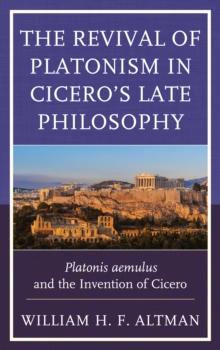Description
| Product ID: | 9781498527118 |
| Product Form: | Hardback |
| Country of Manufacture: | US |
| Title: | The Revival of Platonism in Cicero's Late Philosophy |
| Subtitle: | Platonis aemulus and the Invention of Cicero |
| Authors: | Author: William H. F. Altman |
| Page Count: | 384 |
| Subjects: | Ancient Greek and Roman philosophy, Western philosophy: Ancient, to c 500 |
| Description: | Select Guide Rating Less than two years before his murder, Cicero created a catalogue of his philosophical writings that included dialogues he had written years before, numerous recently completed works, and even one he had not yet begun to write, all arranged in the order he intended them to be read, beginning with the introductory Hortensius, rather than in accordance with order of composition. Following the order of the De divinatione catalogue, William H. F. Altman considers each of Cicero’s late works as part of a coherent philosophical project determined throughout by its author’s Platonism. Locating the parallel between Plato’s Allegory of the Cave and Cicero’s “Dream of Scipio” at the center of Cicero’s life and thought as both philosopher and orator, Altman argues that Cicero is not only “Plato’s rival” (it was Quintilian who called him Platonis aemulus) but also a peerless guide to what it means to be a Platonist, especially since Plato’s legacy was as hotly debated in his own time as it still is in ours. Distinctive of Cicero’s late dialogues is the invention of a character named “Cicero,” an amiable if incompetent adherent of the New Academy whose primary concern is only with what is truth-like (veri simile). Following Augustine’s lead, Altman reveals the deliberate inadequacy of this pose and argues that Cicero himself, the writer of dialogues who used “Cicero” as one of many philosophical personae, must always be sought elsewhere: in direct dialogue with the dialogues of Plato, the teacher he revered and whose Platonism he revived. The Revival of Platonism in Cicero’s Late Philosophy: Platonis aemulus and the Invention of Cicero is a must read for anyone working in classical studies, ancient philosophy, ancient history, or the history of philosophy. Less than two years before his murder, Cicero created a catalogue of his philosophical writings that included dialogues he had written years before, numerous recently completed works, and even one he had not yet begun to write, all arranged in the order he intended them to be read, beginning with the introductory Hortensius, rather than in accordance with order of composition. Following the order of the De divinatione catalogue, William H. F. Altman considers each of Cicero’s late works as part of a coherent philosophical project determined throughout by its author’s Platonism. Locating the parallel between Plato’s Allegory of the Cave and Cicero’s “Dream of Scipio” at the center of Cicero’s life and thought as both philosopher and orator, Altman argues that Cicero is not only “Plato’s rival” (it was Quintilian who called him Platonis aemulus) but also a peerless guide to what it means to be a Platonist, especially since Plato’s legacy was as hotly debated in his own time as it still is in ours. Distinctive of Cicero’s late dialogues is the invention of a character named “Cicero,” an amiable if incompetent adherent of the New Academy whose primary concern is only with what is truth-like (veri simile). Following Augustine’s lead, Altman reveals the deliberate inadequacy of this pose and argues that Cicero himself, the writer of dialogues who used “Cicero” as one of many philosophical personae, must always be sought elsewhere: in direct dialogue with the dialogues of Plato, the teacher he revered and whose Platonism he revived. The Revival of Platonism in Cicero’s Late Philosophy: Platonis aemulus and the Invention of Cicero is a must read for anyone working in classical studies, ancient philosophy, ancient history, or the history of philosophy. |
| Imprint Name: | Lexington Books |
| Publisher Name: | Lexington Books |
| Country of Publication: | GB |
| Publishing Date: | 2016-04-13 |


